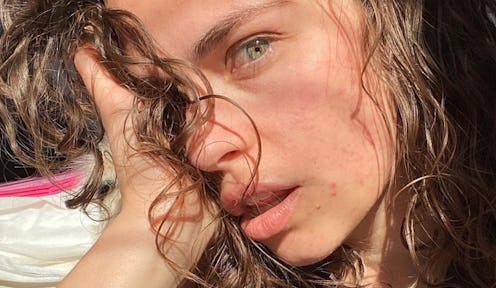Self
The Meaning Behind The #FilterDrop Campaign You're Seeing On Instagram
People are sharing unfiltered photos to Instagram to promote "normal skin."
Would you post a selfie to social media without a filter? In the age of image-altering apps like Facetune and seemingly near-perfect influencers, many would likely say no. Ever since selfie-heavy platforms like Instagram gained widespread popularity, beauty standards have become increasingly high. It's no surprise then that a third of girls and young women will not post selfies online without using a filter. Yet, in response to our filter obsession, a new #filterdrop campaign has emerged online but what is it and how is it helping?
UK based model and make-up artist Sasha Louise Pallari launched the #FilterDrop campaign after noticing influencers "advertising a makeup brand with a beautifying filter on." Taking to Instagram, the 28-year-old claims "false advertising" in this way is contributing to low self-esteem.
"I so strongly wish you would realise the vast scale of damage the constant use of filters are," she wrote in the caption. "Flawless, poreless, scarless, wrinkle-less skin does not exist and it’s only because of the overuse of these [filters] we believe it does."
In a video posted to her Instagram page, the curve model showcased how drastically different filters can make you look. In the clip, she's seen heavily filtered and with her "normal skin."
Following the response to her filter-free images, Pallari has since devoted her Instagram page to normalising skin blemishes on the app, as well as exposing the deceptive nature of filters.
She writes in another post: "Please think about what using filters all the time is doing to our already damaged society. A LOT of money is made from us not feeling good enough. So let this be a reminder that your pores, wrinkles and the texture on your skin are beautiful, yet still the least interesting things about you."
The model also questioned the lasting damage filters could have on children who may base their self-worth on "how beautiful they are" and "the filter they need in order to even be beautiful."
It's a legitimate concern.
As Bustle reported in August, new research by charity Girlguilding, highlighted that two out of five of the young women surveyed "feel upset" that they can’t look like the way they do online.
Between influencer culture and social media adverts, more than half of the girls said they have seen ads that have made them "feel pressured to look different."
"I'm trying to make a change in how filters are used so people aren't dependent on them," says Pallari in another post.
Sign say people are listening. The #FilterDrop campaign has since hundreds of photos of people ditching the filter and sharing what they really look like.
Here's hoping for a more unfiltered reality.
This article was originally published on
